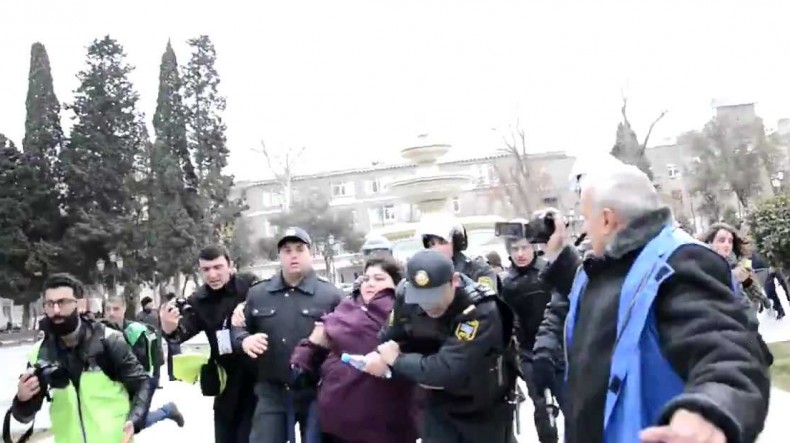
Expert: When pressed on its human rights record, Azerbaijani government claims global Armenian conspiracy
Arzu Geybullayeva was a correspondent for Agos, an Armenian bilingual weekly newspaper published in Istanbul, in 2014 when she faced an ugly campaign from the Azerbaijani government to hurt her credibility with the Azerbaijani people. Authorities called her a traitor because the government was not happy with her critical reporting, Voice of America writes.
“I was doing a lot of work with Armenians at the time. I was co-directing a small not-for-profit organization that did dialogue programs between Armenians and Azerbaijanis. But the funny thing is, when I was called a traitor and they made an enemy of the state out of me, they never mentioned anything about my critical reporting. They always mentioned my Armenian link and how I was writing for an Armenian paper in Istanbul,” she said.
According to Geybullayeva, she was even accused of “selling government secrets.” She noted that it is a very common method to discredit journalists in Azerbaijan. “It's the easiest way to get public support, because we are in a war with Armenia and there are a lot of people who are fed propaganda,” she added.
Voice of America reports that Geybullayeva’s story is included in a new book released by the Committee to Protect Journalists. It brings together essays from female journalists who shared stories about the threats and online abuse they faced while reporting.
Meanwhile, human rights organization Amnesty International writes that famous journalist and researcher Khadija Ismayilova was locked up by the Azerbaijani authorities for exposing high-level corruption. According to the organization, Ismayilova is a prisoner of conscience and must be released immediately.
Khadija Ismayilova is an award-winning Azerbaijani investigative journalist and an outspoken government critic. She has published numerous articles exposing human rights violations and corruption at the highest levels in the country. The authorities punished her first by running a prolonged and retaliatory smear campaign in the state-controlled media and later by bringing trumped-up criminal charges against her.
“The Azeri authorities are very sensitive to public criticism of their human rights record. Generating media attention is an important way to bring pressure on the regime to release political prisoners,” Amnesty International said in a statement.
It is highlighted that on June 19th, Baku will be hosting the European Grand Prix, and this will be a great opportunity to generate media attention in that area.
In his turn, journalist Giorgi Lomsadze writes for Eurasianet.org that human rights lawyer Amal Clooney’s April 26 remarks to the BBC "have hit a raw nerve in Azerbaijan," where her client, investigative journalist Khadija Ismayilova, “is kept prisoner.”
The author writes that after Clooney described the political reasons for Ismayilova’s arrest, the Azerbaijani government apparently did what it always does when pressed on its human rights record -- claimed a global Armenian conspiracy.
“No matter if Clooney’s case at the European Court for Human Rights involves an Azerbaijani journalist’s struggle against the Azerbaijan state. Azerbaijan’s state propaganda will find an ‘Armenian connection’ even if there is none,” Lomsadze writes.
The author reminds that when Clooney said she was taking up Ismayilova’s case, Azerbaijani media claimed that the British lawyer was of Armenian descent. Clooney is, in fact, of Lebanese extraction.
It is highlighted that Azerbaijan’s pro-government media seemed particularly incensed with Clooney’s recent attempt to rally support for Ismayilova’s case in Washington. Clooney told the BBC that she believes international pressure can help free the innocently imprisoned journalist.
In addition, the author writes that an article was published in the Azerbaijani pro-government News.az website that the Armenians paid Clooney to go to Washington and set the White House and Capitol Hill against Azerbaijan. “How far Azerbaijan’s pro-government hacks will go with this theme of an international Armenian conspiracy remains to be seen,” Eurasianet emphasizes.
Related news
- Azerbaijani authorities persecute Meydan TV for exposing Azerbaijani army’s hidden losses in “four-day war”
- Armenia is 74th in World Press Freedom Index 2016
- World Press Freedom Index 2015: Azerbaijan isn’t only behind from Armenia, but also biggest prisoner of journalists in Europe
Newsfeed
Videos






























